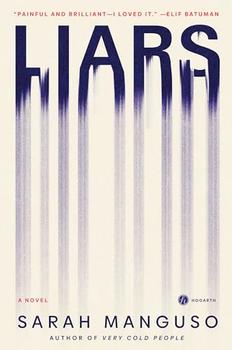Summary | Excerpt | Reading Guide | Reviews | Beyond the Book | Read-Alikes | Genres & Themes | Author Bio

A Novel
by Sarah MangusoThis article relates to Liars
 Sarah Manguso is a poet, essayist, and novelist who is known for, among other things, her short compositional units: all of her non-poetry books are made up of short sections—sometimes just a line; sometimes a longish paragraph—separated by the white space of a line break. Her first few books take the form of a series of nonfiction vignettes, almost prose poems—a review of one of her books described her work as squatting "on a perch between prose and poetry." Her 2017 book 300 Arguments is a collection of short, aphoristic essays—most of them no more than a few sentences. Even her new novel Liars, which, in a departure for her, proceeds straightforwardly in time instead of piecing different moments together, has no traditional paragraph indents—each paragraph is its own standalone unit.
Sarah Manguso is a poet, essayist, and novelist who is known for, among other things, her short compositional units: all of her non-poetry books are made up of short sections—sometimes just a line; sometimes a longish paragraph—separated by the white space of a line break. Her first few books take the form of a series of nonfiction vignettes, almost prose poems—a review of one of her books described her work as squatting "on a perch between prose and poetry." Her 2017 book 300 Arguments is a collection of short, aphoristic essays—most of them no more than a few sentences. Even her new novel Liars, which, in a departure for her, proceeds straightforwardly in time instead of piecing different moments together, has no traditional paragraph indents—each paragraph is its own standalone unit.
Manguso's thoughts on content and form are considered and intelligent, and it's interesting to trace her ideas over time. For one thing, she's opposed to the word "fragment"—"fragmented" is often used to described books like hers, in which short vignettes and observations are collaged together, separated by plenty of white space (e.g., Dept. of Speculation by Jenny Offill, or Maggie Nelson's Bluets). But: "To call a piece of writing a fragment, or to say it's composed of fragments, is to say that it or its components were once whole but are no longer," she writes in 300 Arguments. Later, she declares, "[A]n eight-hundred-page book is no more complete or unbroken than a ten-line poem. That's confusing size with integrity. An ant is not a fragment of an elephant except orthographically."
Manguso has been interested in concision for her entire writing life. In an interview, she describes the allure of writing the 300 arguments: "[T]hose were small, complete works, and I loved the control I had over their small forms"; in a different interview, she says that writing short units "feels like a puzzle, and I love puzzles. To try to distill something until it can be made no smaller without losing something essential about itself."
The opposite of a fragment—or perhaps, in some cases, the true name for what one calls a fragment—is the aphorism. Manguso wrote an essay on the subject for Harper's: "Some literary effects are possible only within the context of a durational reading experience. But I have a thing for writers who deliver their work by the line, the epigram, the apercu," she says by way of introduction. A bit later: "The shortest pieces of writing strive not for greatness but perfection (per, 'completely,' + facere, 'make, do'), the utmost condition of madeness." Her argument is simple and adamant: that bigger is not always better.
Part of her essay can also be read as a response to the trendiness of the fragmented form in literature: "In an age of compulsive shortness and shortening, of simplification and shrinking attention spans, of Twitter and opinions about Twitter, the aphorism may seem inessential, or worse… [But] [t]he brevity of fragments, scraps, the collective brain lint of the internet, is one thing; the brevity of the best aphorisms, which are complete in themselves, quite another."
And yet, as much as Manguso is a lifelong defender of concision, she has also talked about her recent turn toward longer novels, and how the short length of her previous books was due to lack of writing time: "[D]id being a mother and wife make my books shorter? I would have fought this tooth and nail if you had asked me on tour for Ongoingness or 300 Arguments. I didn't want to confess that…my marriage made my books shorter, and it made my work smaller. Never again." About her previous, shorter books, she adds, "they're not bad, but they're not the great project that I am capable of now. And I take great to mean broad and large and ambitious. They're smaller books." The relationship between length, ambition, completeness, and artistry is complicated and fun to consider, and Manguso is one of the smartest and most thoughtful writers to read on this topic.
Sarah Manguso, photo by Beowulf Sheehan, courtesy of Penguin Random House
Filed under Books and Authors
![]() This article relates to Liars.
It first ran in the August 21, 2024
issue of BookBrowse Recommends.
This article relates to Liars.
It first ran in the August 21, 2024
issue of BookBrowse Recommends.
We must believe in luck. For how else can we explain the success of those we don't like?
Click Here to find out who said this, as well as discovering other famous literary quotes!
Your guide toexceptional books
BookBrowse seeks out and recommends the best in contemporary fiction and nonfiction—books that not only engage and entertain but also deepen our understanding of ourselves and the world around us.